- Yokohama-shi Top Page
- Living and Procedures
- Housing and Living
- Waste and recycling
- Plastic Measures
- What is the plastic problem?
Here's the text.
What is the plastic problem?
Last Updated February 20, 2025
What is the plastic problem?
Characteristics of plastics
Plastics are made from petroleum and are also called synthetic resins.
Compared to other materials, it is lightweight, durable, and easy to process, so it is widely used in various products around us and containers and packaging.
On the other hand, it is characterized by its excellent durability and stability, making it difficult to decompose in nature.
What is the problem of marine plastic waste?
If plastic, which has the characteristics that are difficult to decompose in nature, flows into the natural world due to illegal dumping or littering, it will reach the sea through rivers and other means, leading to marine pollution.
It was often reported that the painful appearance of creatures, such as sea turtles stuck with plastic straws in their nose, and whales that swallowed a large amount of plastic bags and plastic garbage mistakenly for food, and starved to death.
In response to this situation, the marine plastic waste problem has become a major problem all over the world.
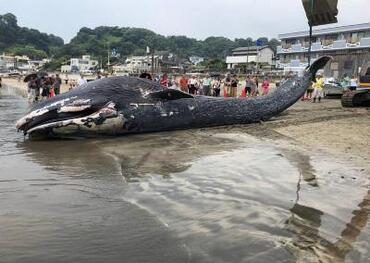 The whale was launched on the coast of Kamakura.
The whale was launched on the coast of Kamakura.
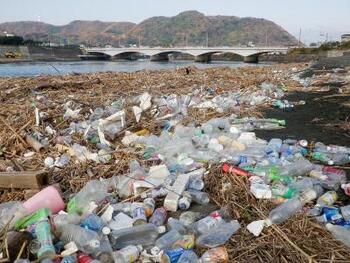 Plastic waste on the riverbank
Plastic waste on the riverbank
Easy-to-understand flyer 1
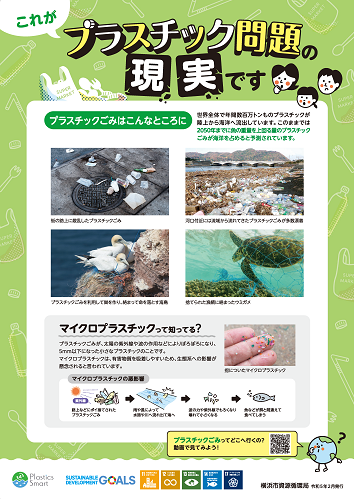 (PDF:2,285KB)
(PDF:2,285KB)
Current status of plastic problems (PDF: 2,285KB)
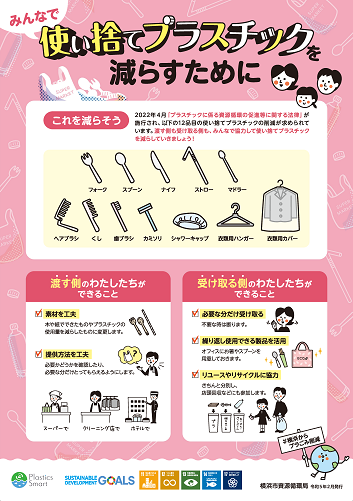 (PDF:1,221KB)
(PDF:1,221KB)
To reduce disposable plastic (PDF: 1,221KB)
Overview of Plastic Problems
■Current status
・One-way plastic containers and packaging emissions per capita in Japan are the second largest in the world (the United States is the first in Japan). ※1
・The separation rate of PET bottles discharged from homes in Yokohama has remained at a high level of 90% or more, while plastic containers and packaging have been used.
The classification rate is in the 60% range.
■Global Warming Issues
・Plastic generates a lot of greenhouse gases (CO2) that cause global warming when burned.
Global warming is said to cause global climate change, such as intense heat of disaster levels and record heavy rains.
■The problem of resource depletion
・Since petroleum resources, the raw material of plastics, are finite, the use of unnecessary plastics leads to resource depletion.
■Problems of marine pollution
・It is estimated that millions of tons of plastic are flowing from land to the ocean annually worldwide, and this is the case by 2050.
It is predicted that more plastic waste than the weight of fish will occupy the ocean. ※2
・There have been reports that plastic is coming out of whales, sea turtles, seabirds, and fish, which have an impact on the marine environment, including ecosystems.
I'm worried about it.
※1 “Single-use plastic: A roadmap-for sustainability” (United Nations Environment Programme, 2018)
※2 “THE NEW PLASTICS ECONOMY ETHINKING THE FUTURE OF PLASTICS” (Elen MacArthur Foundation, 2016)
About microplastics
One of the causes of marine pollution caused by plastics is microplastics.
■What is a microplastic?
Of the plastics, plastics with a size of 5 mm or less are called microplastics and can be broadly divided into two types.
It is said that it is almost impossible to collect microplastics that have flowed into the sea.
| Type | Nature |
|---|---|
| Primary microplastics | They are microplastics, such as pellets, which are raw materials for plastic products, and microbeads, which are contained in face washes and cosmetics. |
| Secondary microplastics | Plastics manufactured in large sizes, such as plastic products, are crushed and subdivided in the natural environment to become microplastics. |
■Microplastic Problems
Although we are still conducting research, it is said that microplastics can easily adsorp chemical substances in water, which may affect ecosystems.
Efforts to tackle the national plastic problem
Ministry of the Environment, “Plastic Resource Recycling Strategy” (outside site)
In response to these problems, the Ministry of the Environment formulated the "Plastic Resource Recycling Strategy" in May 2019.
For more information, please refer to the link below.
Efforts to address plastic problems in Yokohama City
Yokohama Plastic Resource Recycling Action Program
In Motoichi, we devise "Yokohama plastic resources circulation action program" and push forward approach of plastic measures.
For more information, please refer to the link below.
About findings in city river
We are conducting surveys on garbage on three rivers flowing through Yokohama City (Tsurumi River, Katabira River, and Sakaigawa).
・City rivers (Tsurumi River, Katabira River, Sakaigawa) Peripheral Waste Distribution Survey Report (2023) (PDF: 4,991KB)
・Microplastic survey report around city rivers (Tsurumi River, Katabira River, Sakaigawa) (FY2023) (PDF: 1,473KB)
What we can do
Because plastic is a very convenient material, it is used in various places, and it is not realistic to stop using all plastics.
Therefore, it is important to first practice what each of us can do.
Let's start now!
・Use of My Bag ・ ・ ・ ・ ・ ・ Hold my bag and do not get shopping bags
・Use of My Bottles: Hold My Bottles and reduce the use of PET bottles
・Don't litter ... Create a beautiful city with a beautiful heart
・Disposable tableware is NO! ・・ ・ Do not get disposable tableware such as plastic straws, spoons and forks.
・Thorough sorting ... Separate properly into the recycle bin
・Promotion of cleaning activities ・ ・ ・ ・ ・ ・ ・ ・ Actively participate in beautification of the city and environmental conservation
Easy-to-understand flyer 2
[For elementary school students] Everyone's Plastic Measures
Easy-to-understand flyer 3
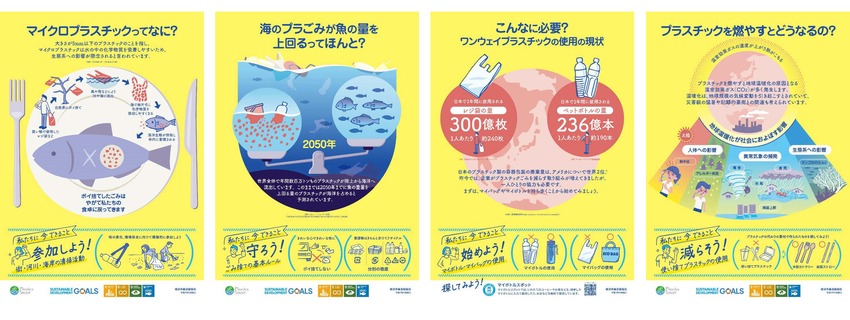
[For elementary school students] Let's take a look at the page of everyone's plastic countermeasures!
You may need a separate PDF reader to open a PDF file.
If you do not have it, you can download it free of charge from Adobe.
![]() To download Adobe Acrobat Reader DC
To download Adobe Acrobat Reader DC
Inquiries to this page
Resources and Waste Recycling Bureau Policy Coordination Department 3R Promotion Section
Telephone: 045-671-3593
Telephone: 045-671-3593
Fax: 045-550-3510
Email address: sj-3rsuishin@city.yokohama.lg.jp
Page ID: 105-858-478


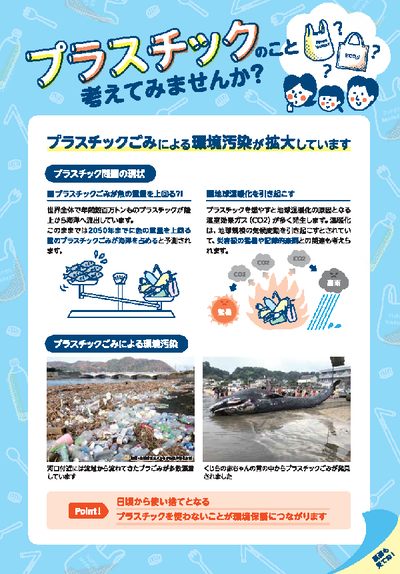 (PDF:754KB)
(PDF:754KB)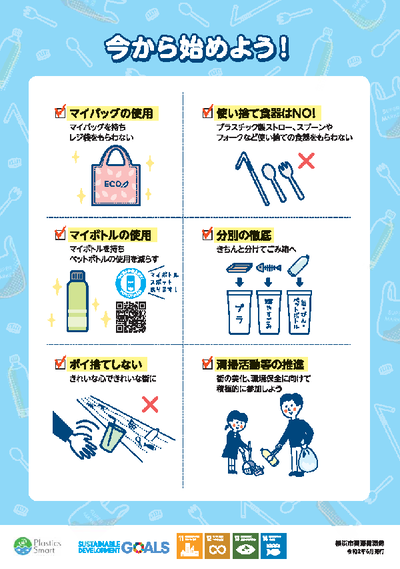 (PDF:800KB)
(PDF:800KB)




